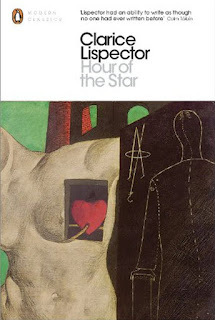Review: The Hour of the Star
 This is Lispector’s last book (she died the same year that it was published). In his essay, 'A Passion for the Void', Colm Tóibín describes the novella as the book in which “all her talents and eccentricities merged and folded”, and, although it is not autobiographical, he suggests it is “an exploration of a self that is sometimes glimpsed but never known.”
This is Lispector’s last book (she died the same year that it was published). In his essay, 'A Passion for the Void', Colm Tóibín describes the novella as the book in which “all her talents and eccentricities merged and folded”, and, although it is not autobiographical, he suggests it is “an exploration of a self that is sometimes glimpsed but never known.”I did not immediately love the book—though it was kind of touch and go—stimulating and intriguing though it is. I am more at home with irreal or absurdist writing that in a way riffs on an idea, gives the reader a thread to cling to regardless of how unpredictable the story that follows and stays with the same idea, however absurd or disconcerting it might be, for long enough that the reader can see the landscape. Lispector disconcerts by being suddenly in one place, then in another, like a springtail, without any evidence of motion in between. “If you see what I am saying, fine,” the narrator says at one point, “if you don’t, that’s fine, too. But why am I bothering with this girl when what I want more than anything is purely ripe and golden wheat in summer?”
There are two things going on in the novella. One is the story of Macabéa, “ugly, underfed, sickly and unloved,” told by her boyfriend Rodrigo, and the other is the story of writing the story. Both are brilliant in their way, but possibly too strong a meat as a first foray into Lispector’s writing. Toibín’s illuminating essay is the introduction to the book, and if this work is the one in which encapsulates Lispector’s writing style, then perhaps it will be better appreciated—by me, at any rate—when these “talents and eccentricities” have been encountered in a less concentrated form.
[Tóibín’s 'A Passion for the Void' is also available as an article in the Guardian.]



